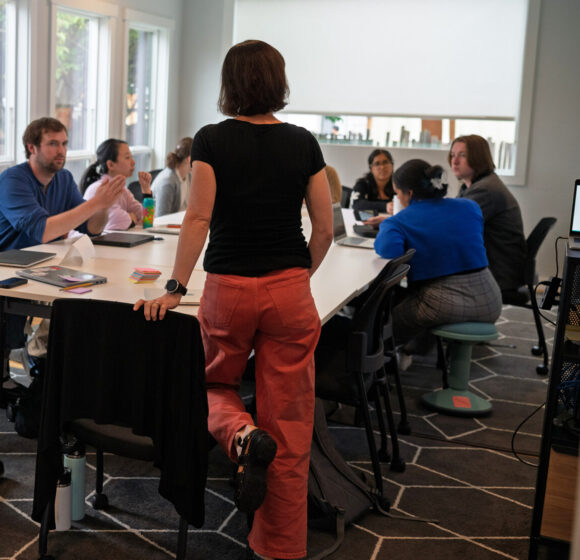The UCDS Institute hosts a range of events, courses, and educational workshops throughout the year–from one-off evening seminars and speaker events to intensive, credit-bearing courses. Our expert faculty design workshops and courses to be fun, informative, and practical.
Earn Credit, Build Community, Enhance Reflective Practice
In partnership with Seattle University, we are pleased to offer local educators an opportunity to enhance their teaching practice with practical and fun continuing education. Teachers can enroll in UCDS Graduate School of Education-taught courses and earn Post BA Credits, Continuing Education Units, and Clock Hours through Seattle University.
Graduate-level courses meet in the evenings, once a week, for ten weeks. Participants will attend small, in-person, practicum-based classes alongside UCDS Master’s degree candidates. All courses are designed and taught by experienced teaching faculty from across the Puget Sound area.
Curious about the type of courses offered?
Here is the 2024-25 course line-up:
Fall Quarter (09/24-12/05)
Student-Centered Curriculum • Tuesdays, 4:30-6:30 pm
Elements of Assessment • Thursdays, 6:00-8:00 pm
Winter Quarter (01/07 – 03/20)
Effective Communication • Tuesdays, 4:30-6:30 pm
Designing Assessment • Thursdays, 6:00-8:00 pm
Spring Quarter (04/01 – 06/05)
Curriculum Design for Social Justice and 21C Skills• Tuesdays, 4:30-6:30 pm
Inquiry in the Classroom • Thursdays, 6:00-8:00 pm
(All course times are PDT or PST.)
Sample Course Offerings
-
EDU 524 Comparative School Cultures
-
2 credits, 20 clock hours available
Classroom culture, school culture, and a community’s culture create the context for learning in our schools. Ron Ritchhart states that “culture is foundational (to schools) and determines how any curriculum comes to life.” This course examines education from both historical and organizational lenses. We will investigate the factors that define and influence school culture. We will use practicum experiences in different schools to analyze the roles played by artifacts, espoused beliefs and values, and underlying assumptions in each community. This study will increase a student’s awareness and understanding of cultural forces and their role in shaping them.
This course will support students to:
- Become more aware of the cultural dimensions, strengths, and challenges.
- Determine from observation and evidence the culture of a school.
- Determine the social, ethical, and moral implications of a specific school’s culture.
- Consider the steps to build/change a culture
- Understand more clearly our individual role and responsibility in institutional culture.
-
EDU 586 The Democratic Classroom: Student Agency and Advocacy
-
2 credits, 20 clock hours available
This course will examine the origins of democracy in education as well as what it means currently in the context of inclusion, equity, and social justice. Together we will explore how school curricula and culture can help youth to discover the ways they can become active, responsive, and compassionate participants in democratic processes. We will investigate how social-emotional learning and confidence intersect with academic learning. We will examine strategies to increase student voice and help create thriving learning communities marked by shared understanding, ownership, and mutual respect for diverse voices.
As this course is designed around the goal of creating a culturally responsive space in our schools for students to equitably share their diverse voices, embrace their identity, and build a community where everyone feels that they belong, each reading response and practicum assignment will ask students to consider these goals.
Participants in this course will help shape our exploration as we grapple with the following questions through lively discussions, salient readings, applicable research, and practicum experiences.
- How does a strong sense of voice deepen a student’s learning experience?
- How do we design an equitable school and classroom culture that cultivates and responds to student identity and authentic experiences?
- How can students develop stewardship of their own learning experiences and communities?
- How can teachers facilitate growth in areas of agency and advocacy?
- What is the developmental nature of student voice and the role of reflective thinking across age groups?
-
EDU 595 Designing a Culture of Inquiry
-
3 credits, 30 clock hours available
What is inquiry-based learning? How can you integrate inquiry in the classroom to spark curiosity and engage students in deeper learning? Designing a Culture of Inquiry will examine the definitions, theories, and impacts of inquiry and identify strategies for enacting inquiry in planning, instruction, and assessment. We will highlight inquiry tools and methods that can be transferred across diverse early childhood through middle school contexts and domains.
Instructors and participants will share and discuss classroom experiences and create plans to integrate new inquiry tools into our work. Additionally, ongoing opportunities to understand inquiry as it relates to the reflective practitioner will be woven throughout the course. Participants will actively engage in the inquiry cycle and investigate how it can provide a guide for continuous professional growth and deeper student learning.
In this course, readings, assignments, and discussion prompts provide a platform that supports reflection and dialog centered on Diversity, Equity, Inclusion, Belonging (DEIB) and teaching as we explore creating a culture of inquiry. Through our work together, we strive to understand culture and its role in an inquiry-based education model. Methods for being culturally responsive and relevant, promoting discourse, and current research on understanding and creating an active classroom supporting DEIB are incorporated into the course.
Are you ready to start earning your Master’s degree? Contact the UCDS Graduate School of Education to find out more and start your application today!

